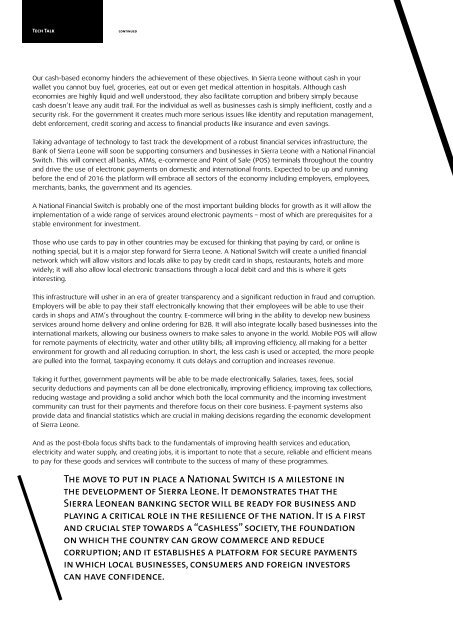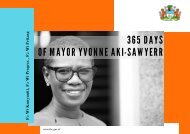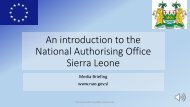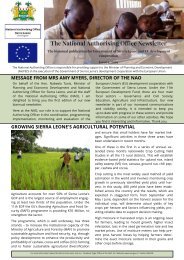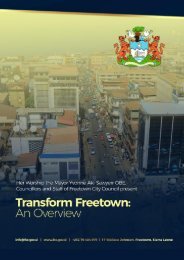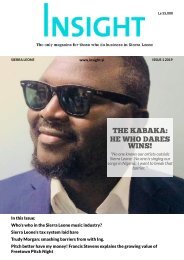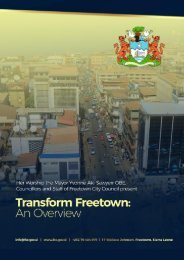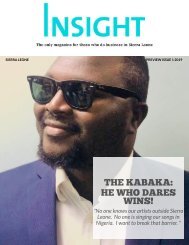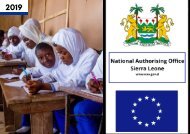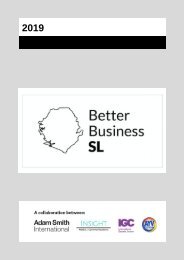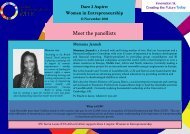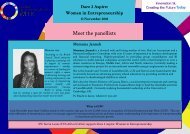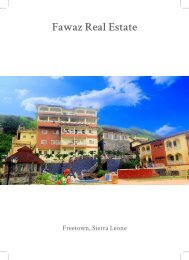FT Insight December 2015
In this Issue Sierra Leone's Foreign Minister, Dr Samura Kamara discusses economic diplomacy & a vision of prosperity. We ask "Is a cashless SL really on the cards?" Crown Bakery’s Fadi Keserwani talks survival & success in Sierra Leone's tough business environment. And we interview one of Sierra Leone's newest change makers - Amara Kuyateh, Deputy DG of NASSIT. Plus read about Cordaid & the missing middle SMEs; Aspen’s prescription for healthy resilience and hear opinions from the sharp end - the incisive, decisive and concise.
In this Issue Sierra Leone's Foreign Minister, Dr Samura Kamara discusses economic diplomacy & a vision of prosperity. We ask "Is a cashless SL really on the cards?" Crown Bakery’s Fadi Keserwani talks survival & success in Sierra Leone's tough business environment. And we interview one of Sierra Leone's newest change makers - Amara Kuyateh, Deputy DG of NASSIT. Plus read about Cordaid & the missing middle SMEs; Aspen’s prescription for healthy resilience
and hear opinions from the sharp end - the incisive, decisive and concise.
Create successful ePaper yourself
Turn your PDF publications into a flip-book with our unique Google optimized e-Paper software.
Tech Talk<br />
continued<br />
Tech Talk<br />
Our cash-based economy hinders the achievement of these objectives. In Sierra Leone without cash in your<br />
wallet you cannot buy fuel, groceries, eat out or even get medical attention in hospitals. Although cash<br />
economies are highly liquid and well understood, they also facilitate corruption and bribery simply because<br />
cash doesn’t leave any audit trail. For the individual as well as businesses cash is simply inefficient, costly and a<br />
security risk. For the government it creates much more serious issues like identity and reputation management,<br />
debt enforcement, credit scoring and access to financial products like insurance and even savings.<br />
Taking advantage of technology to fast track the development of a robust financial services infrastructure, the<br />
Bank of Sierra Leone will soon be supporting consumers and businesses in Sierra Leone with a National Financial<br />
Switch. This will connect all banks, ATMs, e-commerce and Point of Sale (POS) terminals throughout the country<br />
and drive the use of electronic payments on domestic and international fronts. Expected to be up and running<br />
before the end of 2016 the platform will embrace all sectors of the economy including employers, employees,<br />
merchants, banks, the government and its agencies.<br />
A National Financial Switch is probably one of the most important building blocks for growth as it will allow the<br />
implementation of a wide range of services around electronic payments – most of which are prerequisites for a<br />
stable environment for investment.<br />
Those who use cards to pay in other countries may be excused for thinking that paying by card, or online is<br />
nothing special, but it is a major step forward for Sierra Leone. A National Switch will create a unified financial<br />
network which will allow visitors and locals alike to pay by credit card in shops, restaurants, hotels and more<br />
widely; it will also allow local electronic transactions through a local debit card and this is where it gets<br />
interesting.<br />
This infrastructure will usher in an era of greater transparency and a significant reduction in fraud and corruption.<br />
Employers will be able to pay their staff electronically knowing that their employees will be able to use their<br />
cards in shops and ATM’s throughout the country. E-commerce will bring in the ability to develop new business<br />
services around home delivery and online ordering for B2B. It will also integrate locally based businesses into the<br />
international markets, allowing our business owners to make sales to anyone in the world. Mobile POS will allow<br />
for remote payments of electricity, water and other utility bills; all improving efficiency, all making for a better<br />
environment for growth and all reducing corruption. In short, the less cash is used or accepted, the more people<br />
are pulled into the formal, taxpaying economy. It cuts delays and corruption and increases revenue.<br />
LUMA TESTS SIERRA LEONE’S APPETITE FOR MOBILE APPS<br />
Sierra Leone’s mobile phone use is escalating sharply and in its wake is a small but emerging mobile<br />
app economy. One of the most innovative is Luma, which applies smart phone technology to Sierra<br />
Leone’s street markets.<br />
Luma is the brain child of local business owner Bimbola Carrol. He developed and launched the app<br />
to encourage trade between individuals, and give them an easy way to generate cash by selling their<br />
unwanted or unused items. “A Luma is a sort of mobile local market, popular in the provinces. If a<br />
location is having a Luma, all the people in the surrounding towns and villages will bring items they<br />
have for sale,” he explains.<br />
In Q4 of 2012 the total number of mobile subscribers in Sierra Leone was approximately 3,504,000.<br />
By <strong>2015</strong>, the figure had increased by 30% to over 4,570,000 according to figures from GSMA<br />
Intelligence, making the mobile app market one that has significant potential for growth. Mobile apps<br />
aimed specifically at the Sierra Leonean user have focused mainly on mobile money or health – most<br />
noticeably to support the recent Ebola response. Carrol’s offering is something different. Targeted at<br />
18-45 smart phone users, he markets Luma via social media and using direct marketing. “Feedback<br />
has been positive, but it needs continuous marketing,” he says. “It’s a great idea, but tech penetration<br />
in Sierra Leone is still low. I imagine it will take about 24 months before it becomes a self-running<br />
operation.”<br />
For the moment listing on Luma is free, but in the future users will pay to list the items they have for<br />
sale. Luma sales reps would also list items on behalf of trade and take a commission in the event of a<br />
sale.<br />
Luma is currently only for Android mobile phones. Available for download on Google Play.<br />
<strong>FT</strong><br />
<strong>Insight</strong><br />
11<br />
Taking it further, government payments will be able to be made electronically. Salaries, taxes, fees, social<br />
security deductions and payments can all be done electronically, improving efficiency, improving tax collections,<br />
reducing wastage and providing a solid anchor which both the local community and the incoming investment<br />
community can trust for their payments and therefore focus on their core business. E-payment systems also<br />
provide data and financial statistics which are crucial in making decisions regarding the economic development<br />
of Sierra Leone.<br />
And as the post-Ebola focus shifts back to the fundamentals of improving health services and education,<br />
electricity and water supply, and creating jobs, it is important to note that a secure, reliable and efficient means<br />
to pay for these goods and services will contribute to the success of many of these programmes.<br />
The move to put in place a National Switch is a milestone in<br />
the development of Sierra Leone. It demonstrates that the<br />
Sierra Leonean banking sector will be ready for business and<br />
playing a critical role in the resilience of the nation. It is a f irst<br />
and crucial step towards a “cashless” society, the foundation<br />
on which the country can grow commerce and reduce<br />
corruption; and it establishes a platform for secure payments<br />
in which local businesses, consumers and foreign investors<br />
can have conf idence.<br />
www.ftinsight.net


